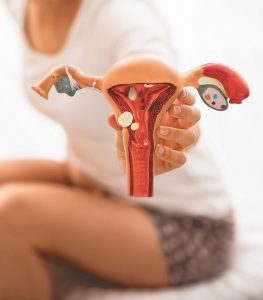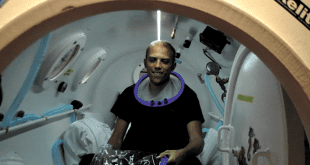By Parveen Vahora, M.D.
 Endometriosis is a painful, chronic condition that affects an estimated 1 in 10 women of reproductive age. It occurs when tissue like that which lines the uterus is found outside the uterus, usually in the abdomen or pelvis. Endometriosis most commonly involves your ovaries, fallopian tubes and the tissue lining your pelvis. Endometriosis can cause pain, infertility, and other symptoms. Treatment typically includes lifestyle changes, medications, and in some cases, surgery.
Endometriosis is a painful, chronic condition that affects an estimated 1 in 10 women of reproductive age. It occurs when tissue like that which lines the uterus is found outside the uterus, usually in the abdomen or pelvis. Endometriosis most commonly involves your ovaries, fallopian tubes and the tissue lining your pelvis. Endometriosis can cause pain, infertility, and other symptoms. Treatment typically includes lifestyle changes, medications, and in some cases, surgery.
The most common symptoms of endometriosis are pelvic pain, pain during or after sex, and heavy periods. Other symptoms include fatigue, bloating, and difficulty getting pregnant. With endometriosis, the endometrial-like tissue acts as endometrial tissue would — it thickens, breaks down and bleeds with each menstrual cycle. But because this tissue cannot exit your body, it becomes trapped. When endometriosis involves the ovaries, cysts called endometriomas may form. Surrounding tissue can become irritated, eventually developing scar tissue and adhesions — bands of fibrous tissue that can cause pelvic tissues and organs to stick to each other.
Endometriosis is a long-term problem without treatment, and it usually lasts until menopause. After menopause, areas of misplaced endometrial tissue tend to become smaller and are less likely to cause symptoms. That is particularly true if your symptoms have come only during menstrual periods.
Various treatments are available for endometriosis, including lifestyle changes, medications, and in some cases, surgery. Lifestyle changes, such as exercising regularly, eating a healthy diet, and managing stress, can help reduce symptoms. Medications, such as pain relievers, hormones, and anti-inflammatories, can also help manage symptoms.
Conservative surgical treatments of endometriosis include a laparoscopic outpatient procedure. During laparoscopy, your doctor will destroy small areas of extra endometrial tissue that are implanted outside the uterus. The surgeon may burn them away or use a laser to vaporize them. Your doctor also may trim away tissue that is displacing your pelvic organs. These procedures are not painful and produce great results; however, the endometrial tissue may also return without adding pharmaceutical treatment.
Oral contraceptives are often used to treat mild to moderate symptoms of endometriosis, but they do not treat the underlying cause of the disease. For more severe cases, two medications have been approved by the U.S. Food and Drug Administration (FDA) for the treatment of endometriosis: Orilissa (elagolix) and Lupron (leuprolide acetate).
One of the new medications approved for the treatment of endometriosis is Orilissa (elagolix). Orilissa, taken orally, is a non-hormonal medication that blocks the action of hormones that stimulate the growth of endometriosis. It is used to reduce moderate to severe pain caused by endometriosis. Orilissa may be used alone or with other medications. Orilissa belongs to a class of drugs called Gonadotropin Releasing Hormone Antagonists. Side effects of Orilissa include headache, nausea, hot flashes, and decreased bone mineral density. In women receiving this drug for endometriosis, hormone replacement therapy is recommended to reduce bone mineral density loss and vasomotor symptoms.
Lupron (leuprolide acetate) is a hormone therapy administered via injection or implant every three to six months. It works by reducing the levels of estrogen, which can help reduce the size of endometriosis implants, decrease pain, and improve fertility. Luperon is also used to treat the symptoms of prostate cancer in men. In women receiving this drug for endometriosis, hormone replacement therapy is recommended to reduce bone mineral density loss and vasomotor symptoms. Common side effects of Lupron include hot flashes, headaches, vaginal dryness, and painful sex.
Don’t just live with your discomfort, get the relief and new beginning that you are worthy of. Call today to schedule an appointment and/or consultation at Info@ParveenVahoraMD.com or call (727) 376-1536.
New patients are welcome!
Schedule your consultation today. We also offer TeleHealth/Virtual consultations.
Parveen Vahora, M.D.
Our gynecologist office is small, intimate, and welcoming. Women under our care are treated with the utmost respect, which means we offer personalized care: educating on conditions and treatment options as well as preventative measures. Our focus is on sexual health, and we’re proud to offer the MonaLisa Touch® for patients going through menopause as well as post-menopausal women, breast cancer survivors, and those suffering from pain during intercourse or intense dryness. We also offer genetic testing for breast, ovarian, and colon cancer. From birth control to robotic surgery, we’ve got you covered.
Our practice treats our patients as we would treat our own family, with the goal of keeping them healthy for many years to come, not just the short-term. We follow Enhanced Recovery After Surgery (ERAS®) protocols, which take a comprehensive look at all areas of the patient’s journey through surgery and recovery, creating a well¬-coordinated, team¬-oriented approach to surgical care for better outcomes. Weaving this into our personalized care plans, we get patients back to their normal routines faster.
Contact us today to schedule an appointment at Info@ParveenVahoraMD.com or during office hours call (727) 376-1536 or text (813) 548 4412. To find out more, please visit ParveenVahoraMD.com.
 Central Florida Health and Wellness Magazine Health and Wellness Articles of the Villages
Central Florida Health and Wellness Magazine Health and Wellness Articles of the Villages


